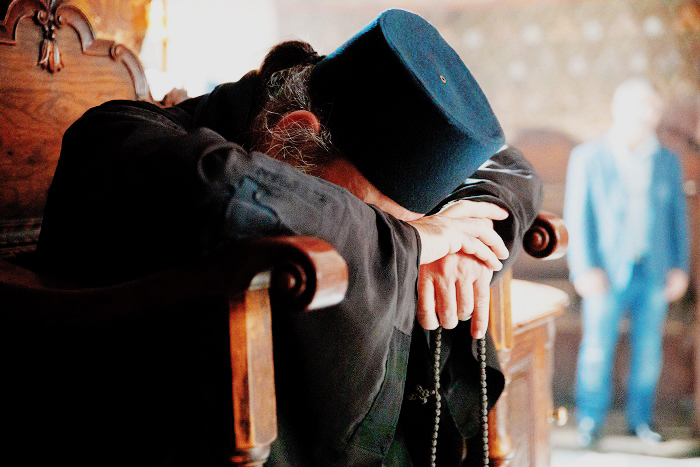Man has always needed silence, but even more so in today’s era of technocracy. It is a fact that we live in a disturbed and noisy environment.
As a consequence, the everyday life of people is disrupted by many psycho-social problems, which are exacerbated by idle conversations, materialistic excess, entertainment, and, above all, by uncritical multiculturalism. Thus, within the very essence of human existence, numerous psychological problems arise—mental illnesses and various disorders, manifesting dominantly as depression, criminal behavior, scandalous lifestyles, and ultimately, the loss of spiritual health.

To this catastrophe is added the great tyrant—loneliness, as it is often called. There is nothing worse than for a person to feel and live in loneliness. It is a painful condition, a true sorrow, to live and feel isolated, even when surrounded by many people, and it is even more dreadful to feel abandoned by family, friends, colleagues, and benefactors. This loneliness is truly a tragic reality and a destructive force against the entirety of human existence, leading to spiritual weakness and slothfulness. However, this loneliness has nothing to do with silence.
Lonely is only the one who lives without God, without the sense of God’s gracious presence. The great theologian, the late Professor Pan. Trembelas used to say, “Do you have God? You have everything. Do you not have God? Even if you possess the whole world, you have nothing.” Thus, we are not alone. God is with us. “The Lord is near.” Do not say again, “I am alone.” No, your life is illuminated by the constant presence of God. He is the greatest community. Moreover, consider that your personal guardian angel never abandons you.
We are speaking, therefore, of Godly silence. We seek this kind of silence—the beneficial, creative, and devout silence. For, through this grace-filled silence, the perspective for the renewal of man opens up. A person who knows how to be silent is renewed. Silence brings peace to the soul. It fosters patience and strengthens moral courage. It inspires beneficial thoughts, and the inner world is calmed. Only through silence in God does anger dissipate, pride diminish, hatred retreat, weakness become strength, fear turn into courage, disappointment transform into useful hope, and faith increase. Through this silence in God, the lost joy of life is found.

Silence, of course, does not mean inactivity. It is not passivity or laziness. It is not emptiness. Instead, it means the renunciation of what is trivial, meaningless, and vain. Here one truly contemplates: “Vanity of vanities, all is vanity” (Ecclesiastes 1:2). Thus, silence is cultivated with a sober mind. It means striving to be alone with oneself. And with the Other One, who is none other than God. The only wall between you and God is your sins. The more you do not remove them, the less you communicate with God. The wall does not fall, you do not see God, and you remain desperately alone.
There, in holy silence, you realize that the ultimate refuge is God. There, you open yourself to God, pray, reflect, weep, repent, plead, give thanks, and glorify. That is why silence is the twin sister of prayer. Silence and prayer are inseparably linked and yield the sweetest fruits. With that silence in God, the hardened heart softens, the soul rejoices, and is lightened and uplifted.
The term “silence (hesychia)” primarily belongs to the lexicon of monastic life. It means seeking God in silence, solitude, and in general, in stillness. It is a great virtue and a supreme attainment of tranquility. But how can one reach that state—this “extremity of perfection” according to St. Isaac the Syrian? We speak of the ordinary, everyday person here in the noisy society. There, in the ascetic and quiet life, the measures and criteria are different. There, the absolute application of the biblical phrase is fulfilled: “I sleep, but my heart is awake” (Song of Songs 5:2), and thus “to people, it seems difficult and unbearable to be spiritually silent from every thought. And it is indeed difficult and laborious,” as St. Hesychius the Presbyter said.
Furthermore, let us not forget that even Christ Himself lived in the wilderness. St. John the Baptist as well. The Apostle Paul prepared himself for three whole years by retreating to the desert of Arabia. St. Basil the Great, together with St. Gregory, practiced silence in the wilderness of Pontus. And Blessed Augustine, after his various wanderings, practiced silence, studied, and found himself on the estate of his friend Verecundus.
It is evident, therefore, that silence does not imply neutrality. It harbors something sacred. Within it lies spirituality, dynamism, and the prospect of renewal and hope. Literally, functionally, and pedagogically, it comes and transforms the mind, brings love, and creates a holy striving for the purification of the soul. Conversely, stress, agitation, nervousness, and noise—all these are of no benefit. They destroy the inner world of man, banish joy and cheerfulness, and yield only bitter fruits as the taste of life.
Only a quiet environment, as a way of life, both internally and externally, is the solution. Thus, experiencing silence in Christ is the most effective remedy against stress, loneliness, and pessimism. Indeed, we find peace and freedom from every storm of this world when we remain alone with God, when we ascend to the Upper Room of the Last Supper, when we walk on the road to Emmaus. Therefore, “let us commend ourselves, one another, and all our life unto Christ our God.”















